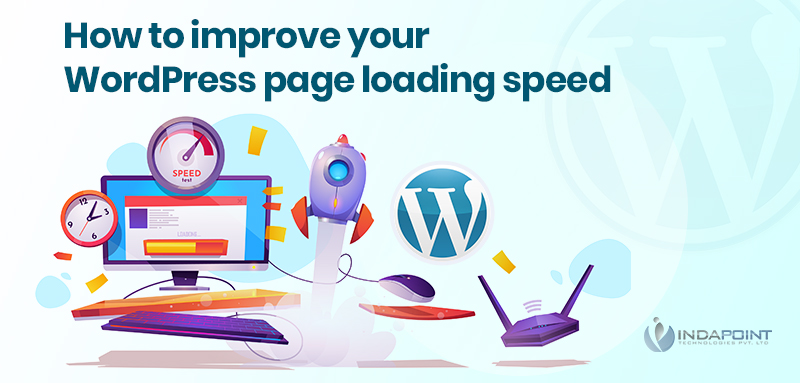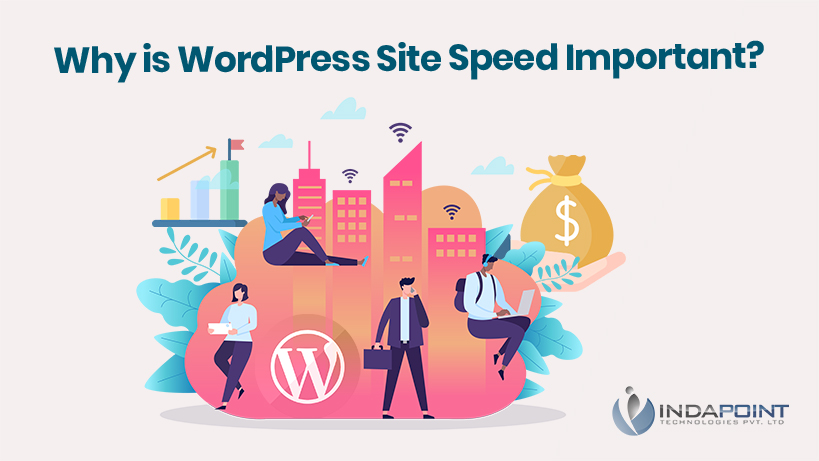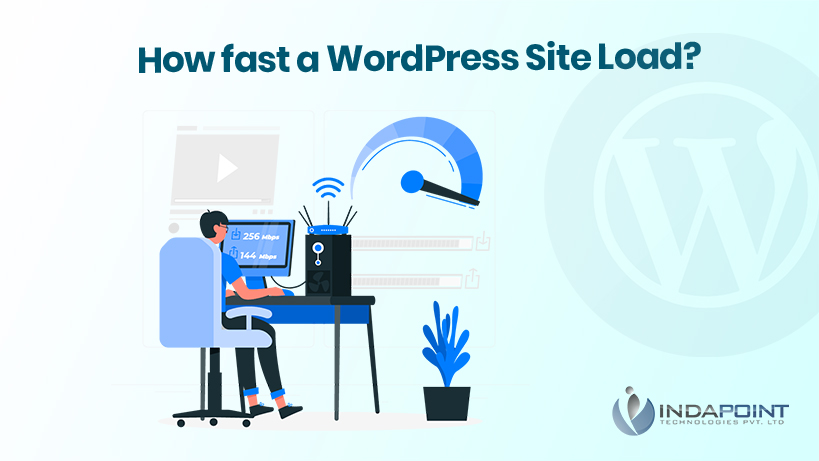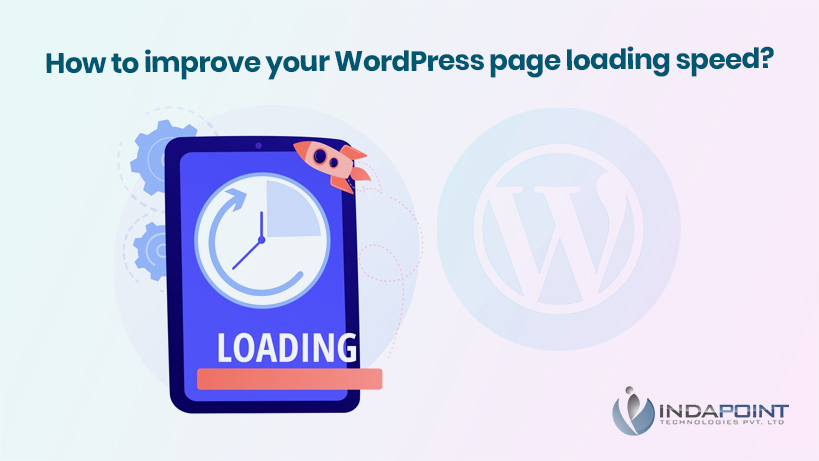How to improve your WordPress page loading speed
June 7, 2021

Everything in today’s digital world revolves around speed and efficiency. If your website takes longer to load than it should, it’s safe to assume that your visitors and bottom line will suffer as a result, so it is better to improve WordPress speed. Many developers and business owners are now aware of this fact and are wondering how to speed up WordPress blogs.
The following information will help you understand how to improve WordPress site speed.
Site Speed WordPress
WordPress is a popular content management system that has swept the globe. Over 75 million websites have been built on the platform. To make things appear beautiful and let your branding shine through, you’ll need plugins, themes, and other tools, just like any other website construction tool.
Unfortunately, regardless of your content management system, these tools can slow things down.
To make WordPress load faster, you can do a few things to improve WordPress speed. You may quickly speed things up by adequately managing your themes, pictures, plugins, and other content. Just keep in mind that before a consumer can fully enjoy your website’s experience, every content management system will need to load all connected elements, whether visible on the page or operating in the background for google page speed optimization WordPress.
You might be wondering what impact loading speeds have on whether or not visitors love your page. Unfortunately, if your page is slow to load, they may not be able to enjoy anything at all.
Why is WordPress Site Speed Important?

The idea of a computer indicating that your page will soon load a thing of the past. Consumers nowadays expect online pages to load quickly. Indeed, 40% said they would abandon a website if it took longer than three seconds to load.
Improve page speed WordPress is the best thing you can do for your company. You will surely lose money and traffic if you do not do so. This is because internet customers are a little impatient.
More than half of all mobile visitors admit to quitting a page just because it takes too long to load. It’s also worth noting that websites that load in 1-2 seconds have roughly three times the conversion rate of those that load in 5-10 seconds, so you have to focus on increasing mobile page speed WordPress.
How fast a WordPress Site Load?

So, when it comes to WordPress website speed, how fast is fast enough? Google reports that the optimum strategy is to maintain your loading times at three seconds or less.
According to the findings, when loading times increase from one to three seconds, the likelihood of a bounce (a user departing immediately away) increases by 32%.
Furthermore, sites that take five seconds or more to load have a 90 percent chance of being bounced. As a result, if you want to keep visitors rather than drive them away, you should aim for average loading times of less than three seconds (and ideally quicker than that). So let’s move on to how to improve WordPress site speed.
How to improve your WordPress page loading speed?

There are several basic methods you may apply on your own to improve WordPress speed. One of the simplest methods is to allow your site to be cached. So, how to improve WordPress site speed, here are a few more pointers to consider.
Perform a Site Speed Analysis
The next stage in optimizing your website’s performance is to figure out how to increase WordPress speed. If you install a plugin or make another modification to your site and want to know how it affects site load times, tracking site speed is recommended.
Use a WP Engine Speed Tool tool to analyze load performance and get WordPress-specific site speed advice on how to make your site perform faster. After you enter your website’s URL, you’ll receive an email with a custom analysis of how quickly your site loads, as well as precise advice for speeding it up.
If you’re a WP Engine user, we recommend using Page Performance in the User Portal to monitor and test the performance of your web page in response to site updates. You may also have regular tests emailed to your mailbox with Page Performance, so you don’t have to set it up manually.
Remove unused plugins and themes
Aside from always keeping your plugins and themes up to date, uninstalling any that are no longer in use is the next step toward a faster site. Unused plugins and themes not only pose a security risk but can also degrade WordPress performance optimization.
You must first deactivate an unused plugin before deleting it. Then go to your list of inactive plugins and delete the ones you don’t need. This will help you to improve page speed WordPress.
Clean Media Library
You may accumulate photos that are no longer in use over time. You should consider eliminating unused media to clear up space.
You can either use a plugin like Media Cleaner or do it manually to get rid of unwanted media. To remove useless media files manually, go to Add Media -> Media Library -> Unattached and delete the files that are no longer in use.
Clean Database
If you don’t check it, your WordPress database will fill up with junk over time. This needless bloat can cause your site to load slowly. You can, however, minimize the size of your database for faster loading by doing regular cleanups.
For example, post-revisions can consume a significant amount of needless space. If a post has 100 KB of material and five modifications, the total amount of space lost is approximately 500 KB.
Cleaning up your database manually with phpMyAdmin is possible, but it can be difficult and dangerous if you don’t know what you’re doing. Installing a plugin to do this task is the safer option if you aren’t a tech whiz. WP-Sweep and Advanced Database Cleaner are both safe bets for sweeping through your database and removing outdated revisions, spam comments, MySQL queries, and other unwanted items.
Javascript and CSS rendering-blocking should be removed
If you’ve been utilizing page test tools to check the speed of your website, you may have come across this tip, which can be confusing. You’ll probably notice a lot of JavaScript files (.js files) loading before your”start render” line if you check at your page’s waterfall view with a tool like webpagetest.org or Pingdom. The term for this is “render-blocking JavaScript.”
JavaScript’s main purpose is to act on a web page, such as a popup or spinning images in a slider. In practice, these actions don’t need to be loaded until your site’s content and styles have fully loaded. So when these tools say “Defer JavaScript Parsing,” they mean “load this thing later in your page instead of at the top.”
Minify JavaScript, HTML, and CSS
CSS, HTML, and other source code files can accumulate over time, making your site run like molasses. Consider minifying your website’s code to give it a boost in speed. The backend of your site will be tuned to be a lean mean machine thanks to minification. This technique works by removing extraneous characters such as spaces, line breaks, and comments from HTML, JavaScript, and CSS files to reduce file size.
As a result, the quantity of data transfer required is reduced, allowing files to execute faster and web pages to load faster. A lot of plugins have been created to minify code. One of the most popular free plugins for this purpose is Autoptimize. You might also use the paid WP Rocket plugin, which aids in site optimization and minification. CSS Compressor is another useful tool for reducing CSS code complexity.
Image optimization
Images are essential for retaining a visitor’s attention on a website. While your site may have a lot of lovely pictures, it’s a good idea to optimize these photos for quick WordPress page speed optimization. You may optimize your photographs in a variety of ways, including compressing them, adding alt text and titles, and building an image sitemap to improve page speed WordPress.
Lazy Pages
Lazy Loading is a great time saver for one-page sites and sites with a large home page. The elements lower down on your page aren’t loaded until the user scrolls down to see them, which is called lazy loading. This allows your site to start rendering faster by avoiding loading all of the content of your big page at once.
Limit comments per page
While it’s great to have so many people read your blog content, a lot of comments can slow down page load speed. It’s a good idea to divide the comment section across pages to reduce the time it takes for them to load.
Simply go to Settings -> Discussion and click the “Break comments into pages” option to limit the number of comments that show per page. The number of comments per page can then be chosen (default is set to 50).
Run the latest version of PHP
The latest version of PHP can make a significant difference in the speed of your website. Use WP Engine’s PHP Compatibility Checker plugin to see if your site is ready to upgrade to the latest PHP environment.
It’s also simple to update to the latest version of PHP on your own, which you may do by heading to your user portal.
Choose a lightweight, fast theme
WordPress themes aren’t all made equal; some are better written than others. If your site takes too long to load, it’s pointless to have a stunning UI design.
Rather than selecting a feature-rich theme (which requires a lot of code to be loaded every time someone visits your site), go for a minimalist approach and use a theme that only has the fundamental essentials.
Use a CDN
Your content should be served lightning quickly regardless of the user’s location. However, this is not always possible… That is if your website isn’t hosted on a network that includes data centers in different parts of the world. When it comes to content delivery, the distance might cause delays, which is where a content delivery network (CDN) comes in handy.
Because a CDN is configured, your website will use an optimized server that is closest to your site visitor, your page load times will be faster. Users will receive static content and files from the data center, which will be delivered to them based on their location. Because the static content is already ready to send, instead of requesting a large amount of HTTP at once, this can assist reduce external HTTP requests.
Browser caching
When your web server sets up HTTP headers to provide a cache expiration time, it also sets up browser directives for how long the web page should be cached in the visitor’s browser. This instructs your visitor’s browser to download your website’s elements (such as CSS, JavaScript, and graphics) from their local disc rather than from the internet.
Because the browser will make fewer network connections as a result, your web page will load faster for them.
It’s also critical to add an expiration date in your HTTP headers so that the browser understands when to fetch resources from the network as if they were new, rather than from their local system.
Conclusion
So, these were the points you should follow to improve page load speed WordPress. We are a top WordPress development company that offers startups, enterprises, and entrepreneurs feature-rich, high-quality, strong, and secure WordPress development services in USA.
Hire WordPress developer in USA who has over 15 years of expertise in designing WordPress websites that are tailored to your specific business requirements.
So, you’re seeking a WordPress Development Company or want to employ a team of specialized WordPress Developers at a low cost? We’re here to assist you.




